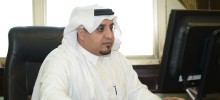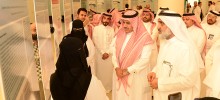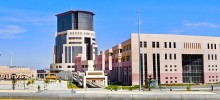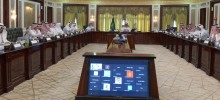University organizes binding mechanisms between research and industry symposium

On the sidelines of the 22nd meeting of the leaders of higher education in the Gulf Cooperation Council
King Khalid University organized a symposium about binding mechanisms between research and industry
A symposium was held on Sunday evening to highlight the national trend and economic transformation of knowledge through the linkage between universities and industry. The symposium was held with the purpose of creating the linkage between scientific research and industry mechanisms. The symposium was on the sidelines of the 22nd meeting of the Presidents and Directors of universities and higher education institutions from the Gulf Cooperation Council counties. The meeting is organized by King Khalid University.
The symposium also aimed at identifying the role of the public sector in the linkage between universities and industry, and it has presented a review of the partnership between universities and industry experiences, as well as identifying the main challenges and obstacles faced by this partnership and ways to solve these challenges and obstacles, in addition to identifying the universities's roles in preparing graduates according to industry labor market requirements.
For his part, the Undersecretary of King Khalid University for Development and Quality, Dr. Ahmed Aljbaili, discussed the first axes of the symposium, which was about preparing universities's outputs in accordance with the labor market and industry requirements. Aljbaili submitted a worksheet in which he talked about a proposed strategy to link the university output with the needs of the labor market and industry. The proposed strategy contained a number of points, most notably the harmonization of the educational system outputs – especially higher education stage - and the needs of the labor market which is of utmost necessity and priorities that will contribute to the goals of the educational system to the overall development, and which will contribute to the achievement of the Vision 2030. Moreover, employability should be considered as a component of an integrated system includes directing the march of professional life (Carrier guidance), and entrepreneurship, all with the aim of aligning learning outcomes with labor market needs. The development of competencies of employment and skills is not the responsibility of educational institutions alone.
The second part of the symposium concentrated on the role of the public sector. It was presented by a representative of the Ministry of Energy and Industry and Mineral Resources. The presentation here focused on linking the industry and the universities. The Undersecretary of the Ministry of Energy and Industry and Mineral Resources, Eng. Ali Saleh A Solamy, presented a scientific paper in which he talked about the strategy of the Ministry of Energy and Industry and Mineral Resources to achieve the ambitious vision of the Kingdom of Saudi Arabia in 2030 - Vision 2030 - in the field of industry, and the role played by the Deputy Ministry of Industry - during the past two years - to encourage the investment of scientific research in the industry through four axes, namely industrial cooperation with the different countries in the world, openning communication with the Saudi universities, agreements and initiatives of industrial development in industry agency, in addition to the focus of the agency to participate with other governmental bodies in international meetings in this aspect.
Another worksheet spotted also the most successful global models in the importance of the role of scientific research in the industrial progress and the mechanism for cooperation in a number of countries around the world. In conclusion, the lecturer highlighted the most important statistics of industrial activity in the Kingdom of Saudi Arabia and the extent of the industrial investment in the various regions of the Kingdom.
In turn, Dr. Amr Omari, from the development affairs sectorial agency at the Ministry of Economy and Planning, in the topic of the transition to the knowledge economy through the linkage between universities and industry, presented a worksheet entitled Vision 2030 and the transition to a knowledge society. Through this worksheet, Dr. Omari went through the Saudi Arabian overall efforts in support of the transition to knowledge society by examining national plans and strategies, specifically the review with respect to scientific research and industry in the five-year plans of the Kingdom of Saudi Arabia, through the national plan for Science, technology and innovation (Knowledge 1), the national strategy for the industry, and efforts to shift to a knowledge-based society.
The second part of the lecture focused on an overview of the value chain system of scientific research in the Kingdom of Saudi Arabia (KSA), the results of scientific research in the KSA ,and the current status, with an explanation of the challenges, benefits and needs faced by the value chain for scientific research to be converted into industrial output. This can be done by examining the following: input, output, outcome and impact. The lecture concludes with a discussion of what is expected for the achievements of the Vision 2030, and for increased partnership between scientific research and industry in the Kingdom of Saudi Arabia.
The Dean of Scientific Research, at King Fahd University of Petroleum and Minerals University, Prof. Nasser Oqaili, presented a worksheet in which he talked about an integrated system of scientific research and innovation in universities (the closest chances of success to achieve the vision of the Kingdom). This paper was in the third axes of the symposium which handled the goal of becoming a knowledge-based economy by linking the universities and the industries. Porf. Oqaili pointed it out that since the emergence of the civil societies and since the beginning of development and growth of those societies, universities had started to have a prestigious position in production and dissemination of knowledge through sober scientific research. Universities are considered prime for community development. Cherishing universities has become one of the most important progress standards of societies and nations in general. And universities already contain elements that qualify them to carry out the desired research roles so as to accelerate progress in the community where the best minds are capable of research, understanding, and creativity - represented by professors and researchers - and the best talented students who are eager to learn and to contribute actively to build their communities. Prof. Oqaili stressed that with the availability of those elements, it had become normal to see universities understand and solve many of the challenges facing the nations, and to go higher with communities. He added, "in the present day, a university is classified according to the intensity of its research work, reaching in some cases to the stages that there are universities established only for the sake doing research. Indeed, the availability of the required infrastructure and support to help carry out scientific research besides outstanding minds, are very important. It is important also the universities should develop strategies to put well-prepared strategies to use these data and to direct them in the right way". He further pointed out that universities establish alliances to improve outputs. Among these alliances, is that with the industry to play an important role in the provision of valuable services for industrial enterprises and to contribute to the economic transformation.









